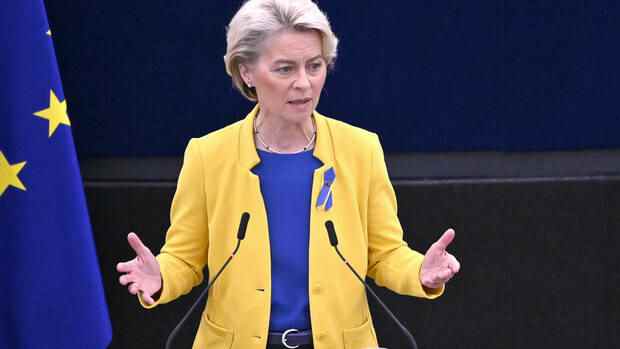The EU Commission President has further sanctions against Russia drawn up.
(Photo: IMAGO/Future Image)
Brussels The EU wants to react quickly to the Russian escalation in the Ukraine war. On Wednesday evening, the 27 EU foreign ministers met on the fringes of the UN General Assembly in New York for a crisis meeting. In a unanimous declaration, they announced that they would impose additional sanctions on Russia “as soon as possible”.
The EU Commission will discuss the first proposals with the member states in the coming days. They would have to be decided unanimously by the 27 EU ambassadors in Brussels.
The meeting of foreign ministers in New York was informal, so no specific sanctions could be decided upon, said EU foreign policy chief Josep Borrell. “It’s clear that a few hours after Putin’s speech, it was about sending a strong message. That was the purpose of the council meeting.”
Borrell added that the EU will reach the necessary unanimity for further action. However, this can be doubted. Hungary’s Prime Minister Viktor Orban sent the opposite message on Wednesday: he called for the sanctions against Russia to be lifted by the end of the year at the latest.
Top jobs of the day
Find the best jobs now and
be notified by email.
According to the pro-government daily Magyar Nemzet, Orban said at a faction meeting of his party that the punitive measures had been “forced on the European governments by the Brussels bureaucrats”. They caused economic problems, the energy crisis and inflation. Orban had already delayed and watered down the EU’s previous sanctions packages.
The EU is also gradually running out of options. Even with the last sanctions packages, it was increasingly difficult to find additional measures that all 27 countries could agree on.
EU needs unanimity for further sanctions
For example, Hungary had insisted on an exception for pipeline oil in the oil embargo. On top of that, Greece, Cyprus and Malta had succeeded in allowing European tankers to continue transporting Russian oil.
Most recently, the EU governments imposed a partial import ban on Russian gold in July and imposed export bans on other so-called dual-use goods. Dual-use items can be used for both civil and military purposes. Even these tightenings were so minimal that diplomats did not want to talk about a seventh package of sanctions at the time.
Borrell now indicated that further Russian people and other economic sectors would be subject to punitive measures. Specifically, he mentioned the technology sector. The previous export restrictions for Western tech goods are considered a success because important preliminary products and spare parts are now missing in Russian industry and the military.
>> Read here: Energy Crisis in Europe – On the way to the deindustrialized continent?
It would be a big step if the EU decided on an oil price cap. The USA has been demanding this for months. The idea is to act as a Western buyers’ cartel and set a price cap on Russian oil.
This could significantly reduce the Kremlin’s income. So far, the EU countries had shied away from it because they feared a Russian delivery stop in retaliation.
A price cap would also mean that European tankers would only be able to transport Russian oil at a fixed maximum price. This means that Russia’s exports to the rest of the world would also be affected and a corresponding hole in the Kremlin coffers.
Economists consider a price cap to be very effective. The federal government has also spoken out in favor of this. In view of the strong shipping lobby in the EU, however, an agreement will not be easy.
More: Military experts analyze Putin’s new moves
